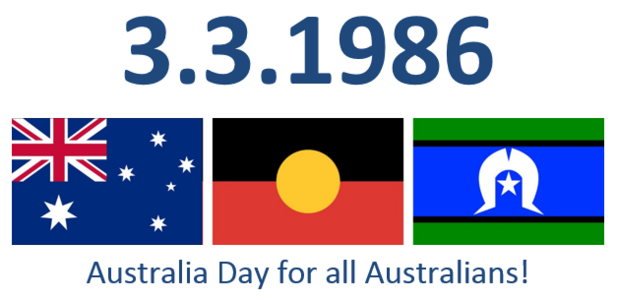I'm uncomfortable knowing that a minority of fellow Australians, our First Nations people, are in distress each year as Anglo-Australians appear to endorse and celebrate their dispossession. While most Anglo-Australians may not think that their celebrations are directly targeting our thriving indigenous population, and are merely celebrating our national good fortune, it is demonstrably true that our koori cousins have not enjoyed a share of this fortune with the rest of us.
Change the date
Recent moves to promote changing the date of our national day are informed by the fact that many Australians - both Indigenous and non-Indigenous - feel they cannot celebrate on January 26, because that date marks the commencement of a long history of dispossession and trauma for Aboriginal and Torres Strait Islander people.
January 26 is the day that positions European settlement as the primary source of national identity and pride. In doing so, it ignores more than 76,000 years of pre-colonial history and 230 years of multicultural migration to Australia.
Australia Day was only formalised as a national holiday in 1994 – to some, that’s not a very longstanding tradition. While it has been celebrated in NSW as far back as 1818, we’ve only been celebrating it in an organised manner as a country for a couple of decades.
By comparison, Indigenous Australians have been protesting on the date since 1938 (the Anglo-Australian sesquicentennary). The Indigenous communities declared it a Day of Mourning that remains recognised to this day.
A new date
Signed by Queen Elizabeth II and PM Bob Hawke, the Australia Act was enacted simultaneously in Australia and the UK on 3 March 1986. This made Australia a sovereign, independent and federal nation. This was the first time Australia was declared independent. That's something all Australians can celebrate.
Aboriginal and Torres Strait Islander people and all Australians can't currently celebrate Australia Day on January 26. It's a date that marks white settlement and 'invasion' from 1788. It has been a day of mourning formally since 1938.
Isn't it time to throw a kangaroo on the coals, next to the lamb on the barbie? Celebrate Australia Day on March 3, for all Australians.
Drop Bear (Thylarctos plummetus). Drop Bears can be difficult to recognize due to their close resemblance to koalas. Both animals have round, grey bodies, fluffy ears, and large black noses. Both inhabit eucalyptus trees and are largely sedentary, spending up to 20 hours each day sleeping. It is during the remaining four hours, however, that the differences between the species become frighteningly apparent. In the wild, it's only when one snarls that the difference becomes apparent - but by then it's too late.
I ALMOST went there!! LMAO! I just wasn't sure if it was offensive or what not? When ever I hear Australia, the first things that pop in my head are, killer surfing/beaches, kangaroos, and koala bears!
https://www.gayboystube.com/blog/65139.html
Broome, Western Australia
Victor Harbour, South Australia
I'm uncomfortable knowing that a minority of fellow Australians, our First Nations people, are in distress each year as Anglo-Australians appear to endorse and celebrate their dispossession. While most Anglo-Australians may not think that their celebrations are directly targeting our thriving indigenous population, and are merely celebrating our national good fortune, it is demonstrably true that our koori cousins have not enjoyed a share of this fortune with the rest of us.
Change the date
Recent moves to promote changing the date of our national day are informed by the fact that many Australians - both Indigenous and non-Indigenous - feel they cannot celebrate on January 26, because that date marks the commencement of a long history of dispossession and trauma for Aboriginal and Torres Strait Islander people.
January 26 is the day that positions European settlement as the primary source of national identity and pride. In doing so, it ignores more than 76,000 years of pre-colonial history and 230 years of multicultural migration to Australia.
Australia Day was only formalised as a national holiday in 1994 – to some, that’s not a very longstanding tradition. While it has been celebrated in NSW as far back as 1818, we’ve only been celebrating it in an organised manner as a country for a couple of decades.
By comparison, Indigenous Australians have been protesting on the date since 1938 (the Anglo-Australian sesquicentennary). The Indigenous communities declared it a Day of Mourning that remains recognised to this day.
A new date
Signed by Queen Elizabeth II and PM Bob Hawke, the Australia Act was enacted simultaneously in Australia and the UK on 3 March 1986. This made Australia a sovereign, independent and federal nation. This was the first time Australia was declared independent. That's something all Australians can celebrate.
Aboriginal and Torres Strait Islander people and all Australians can't currently celebrate Australia Day on January 26. It's a date that marks white settlement and 'invasion' from 1788. It has been a day of mourning formally since 1938.

Isn't it time to throw a kangaroo on the coals, next to the lamb on the barbie? Celebrate Australia Day on March 3, for all Australians.
Sydney surf beaches
Drop bear warning
Drop Bear (Thylarctos plummetus).
Drop Bears can be difficult to recognize due to their close resemblance to koalas. Both animals have round, grey bodies, fluffy ears, and large black noses. Both inhabit eucalyptus trees and are largely sedentary, spending up to 20 hours each day sleeping. It is during the remaining four hours, however, that the differences between the species become frighteningly apparent. In the wild, it's only when one snarls that the difference becomes apparent - but by then it's too late.
I ALMOST went there!! LMAO! I just wasn't sure if it was offensive or what not? When ever I hear Australia, the first things that pop in my head are, killer surfing/beaches, kangaroos, and koala bears!